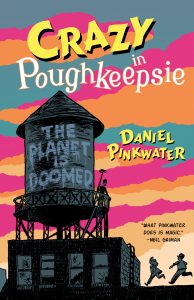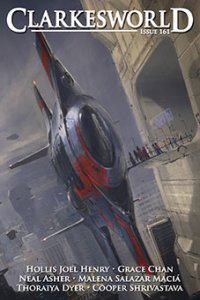Gary K. Wolfe Reviews Crazy in Poughkeepsie by Daniel Pinkwater
 Crazy in Poughkeepsie, Daniel Pinkwater (Tachyon 978-1-61696-374-3, $16.95, 192pp hc) April 2022.
Crazy in Poughkeepsie, Daniel Pinkwater (Tachyon 978-1-61696-374-3, $16.95, 192pp hc) April 2022.
There’s always a degree of satisfaction, maybe bordering on smugness, in finding that a favorite quirky writer is also a favorite of other writers you respect. In a career of half a century, Daniel Pinkwater has gained the admiration of writers as diverse as Cory Doctorow, Neil Gaiman, and Charlie Jane Anders – some lucky enough to have discovered him in childhood. Some of Pinkwater’s early books were for 4-8-year-olds, and he’s probably best known now for his middle-grade and YA novels such as The Snarkout Boys and the Avocado of Death, Young Adult Novel, and more recently 2020’s Adventures of a Dwergish Girl. Molly, the indefatigable title character from that novel, also shows up in Crazy in Poughkeepsie, although it isn’t really a sequel. Instead, it’s narrated by Mick Katz, whose family is in the kibble pet-food business and who has just returned from summer camp to find his room occupied by a guru brought back from the Himalayas by his older brother, along with the guru’s dog Lhasa. In keeping with Pinkwater’s long tradition of good-natured flim-flam, the guru has the suspiciously un-Himalayan name of Lumpo-Smythe-Finkel, and eventually admits he’s originally from New Jersey. Not only does Mick find himself sharing his room, but he soon becomes the guru’s only pupil, since Mick’s brother has decided that the quest for enlightenment, and especially meditation, is simply too boring. Soon he’s accompanying the guru on apparently aimless long walks around Poughkeepsie, cadging food from households along the way.
Things begin to change rapidly when Vern Chuckoff, Mick’s cynical best friend from camp, shows up with Molly, who has escaped her family of ‘‘dwergs’’ hidden in the remote Catskills in order to see the world and undertake a life of petty crime, despite claiming to have a vast fortune at her disposal. Vern has turned into an environmental activist, spray-painting ‘‘The Planet is Doomed’’ on local landmarks and even replacing the bland contents of fortune cookies with dire warnings. All three become a team when they are instructed by the guru to find a blue circus wagon in an obscure neighborhood called Tod Town, where a surprising number of residents are ‘‘of unusual appearance.’’ Pinkwater seldom gets more specific than this, and in one of the novel’s few purely didactic bits, Molly warns Mick about remarking their appearance: ‘‘When you encounter someone physically radical, do not speak about the person as if they were not present, whisper to who you’re with, or make faces or gestures’’.
But the unusual people are not the most remarkable thing about Tod Town, as they learn from Valther van der Seagull, a local collector of – surprise! – antique circus wagons. The most remarkable thing about the town is that it’s full of ghosts, not only from the era of traveling circuses, but even from the earlier era of whaling, which actually did establish an industry in Poughkeepsie because of the long reach of the Hudson River. (Interestingly, this is the second novel I’ve seen recently involving ghosts and the unlikely upstate New York whaling history, along with Sam J. Miller’s The Blade Between.) By the time it’s over, Crazy in Poughkeepsie turns into a remarkably sweet-natured mystical fantasy about helping a beloved ghost whale find its way to whale heaven. But throughout, it remains a characteristic Pinkwater tale of unexpected turns, hilarious sidebars, and above all a celebration of the outsider – or at least of the quirks and obsessions that make us all outsiders at one time or another. And, as always, it’s wickedly funny.
Gary K. Wolfe is Emeritus Professor of Humanities at Roosevelt University and a reviewer for Locus magazine since 1991. His reviews have been collected in Soundings (BSFA Award 2006; Hugo nominee), Bearings (Hugo nominee 2011), and Sightings (2011), and his Evaporating Genres: Essays on Fantastic Literature (Wesleyan) received the Locus Award in 2012. Earlier books include The Known and the Unknown: The Iconography of Science Fiction (Eaton Award, 1981), Harlan Ellison: The Edge of Forever (with Ellen Weil, 2002), and David Lindsay (1982). For the Library of America, he edited American Science Fiction: Nine Classic Novels of the 1950s in 2012, with a similar set for the 1960s forthcoming. He has received the Pilgrim Award from the Science Fiction Research Association, the Distinguished Scholarship Award from the International Association for the Fantastic in the Arts, and a Special World Fantasy Award for criticism. His 24-lecture series How Great Science Fiction Works appeared from The Great Courses in 2016. He has received six Hugo nominations, two for his reviews collections and four for The Coode Street Podcast, which he has co-hosted with Jonathan Strahan for more than 300 episodes. He lives in Chicago.
This review and more like it in the March 2022 issue of Locus.
 While you are here, please take a moment to support Locus with a one-time or recurring donation. We rely on reader donations to keep the magazine and site going, and would like to keep the site paywall free, but WE NEED YOUR FINANCIAL SUPPORT to continue quality coverage of the science fiction and fantasy field.
While you are here, please take a moment to support Locus with a one-time or recurring donation. We rely on reader donations to keep the magazine and site going, and would like to keep the site paywall free, but WE NEED YOUR FINANCIAL SUPPORT to continue quality coverage of the science fiction and fantasy field.
©Locus Magazine. Copyrighted material may not be republished without permission of LSFF.







